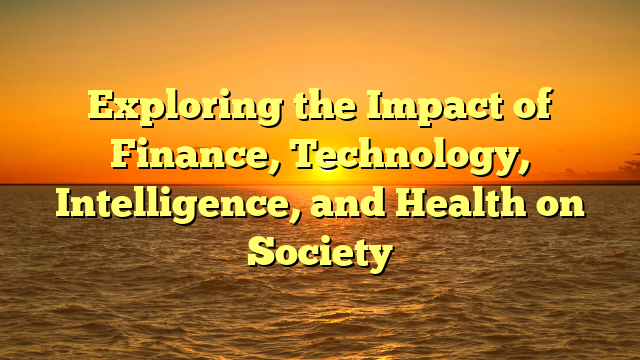
As we continue to advance in multiple sectors, the convergence of finance, technology, intelligence, and health has reached a critical point. These areas are not only affecting each other but are also driving societal change in profound ways.
Finance and Technology: A Transformative Partnership
Finance has always been a crucial part of the global economy, but with the advent of technology, it has undergone significant transformation. The rise of fintech companies has made money management easier to a broader range of people. Technologies like blockchain and cryptocurrencies have not only revolutionized the traditional financial system but have also opened the door for new forms of transactions and investments.
With AI, financial institutions can provide more personalized services, analyze data at a massive scale, and optimize decision-making processes. Big Data, cloud computing, and machine learning are also contributing to the growth of the financial sector by offering faster, more reliable services.
Intelligence: The Key to Unlocking Potential
The development of artificial intelligence, alongside human intelligence, has been key to creating smarter financial tools and technologies. Human intelligence brings innovative ideas, complex problem-solving abilities, and emotional intelligence to the table, while AI provides precision, efficiency, and scalability. Together, they can solve problems that neither could achieve alone.
AI is capable of processing vast amounts of data, discovering patterns, and offering insights that are essential in fields like finance and healthcare. In healthcare, AI has been instrumental in areas such as disease diagnosis, patient care optimization, and personalized medicine. It can revolutionize healthcare practices by improving efficiency and reducing errors.
The Impact of Technology on Health
Technology is reshaping healthcare by offering new tools for diagnosis, treatment, and health monitoring. Medical devices, telemedicine, and health apps have made it easier for individuals to access care remotely, monitor their health, and manage chronic conditions.
Telemedicine, for example, has become a lifeline during the COVID-19 pandemic, enabling people to consult with healthcare providers without leaving their homes. On the other hand, health apps help individuals maintain mental health, track fitness goals, and receive personalized nutrition advice.
milenkoweddings.com and fitness trackers help users monitor their health by tracking steps, heart rate, and even sleep quality. These technologies not only promote personal health but also contribute to preventive care, allowing individuals to act early on potential health issues.
Bridging the Gap Between Finance, Technology, Intelligence, and Health
The interconnectedness of these fields allows for groundbreaking solutions in healthcare, financial systems, and beyond. For instance, Integrating AI and blockchain in health insurance can improve claims management and enhance fraud detection. Similarly, fintech companies are working on solutions that incorporate data-driven insights into investment strategies that support health-related ventures.
Moreover, health metrics gathered from wearables can be used to personalize financial products such as insurance or wellness incentives.
The Future of Finance, Technology, Intelligence, and Health
Looking ahead, the integration of finance, technology, intelligence, and health will continue to evolve at an exponential pace. With the rapid development of new technologies, we can expect an even more interconnected future for finance, healthcare, and intelligence.
As we move forward, we are likely to witness the creation of a highly personalized and efficient global ecosystem that benefits individuals and communities alike.





